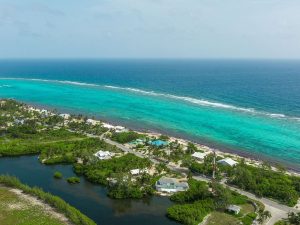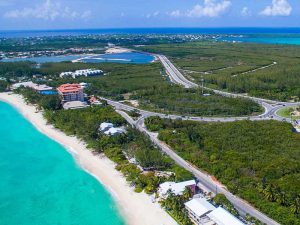Offshore Banking
For almost four decades the Cayman Islands has enjoyed unprecedented economic growth as a direct result of its financial services industry. While the tourist sector continues to play a very important part in the domestic economy, Cayman’s real wealth has been generated by its offshore services and tax neutral status. The growth of the country’s financial golden goose started, so legend has it, in 1794.
In the swashbuckling days of pirates and tall ships, it is said that a convoy of produce laden ships headed to England from Jamaica ran aground on the reef located off the east coast of Grand Cayman. The tale of the “Wreck of the Ten Sails” suggests that as this maritime tragedy struck, the people of East End came to the rescue in their small crafts and saved the lives of some 400 men who were aboard the merchant vessels. In the wake of their heroic feat, the story has it that, as a reward the reigning British monarch, King George III, awarded the Cayman Islands its tax free status.
Although Cayman’s first commercial bank, Barclays, opened its doors in 1953, it wasn’t until the 1960s that the tax free status was put to the test. Having maintained its position as a colony of the British Empire when the rest of the Caribbean, in particular Jamaica (through which Cayman had been administered), sought independence, the islands retained English common law which combined with its tax neutral position gave the jurisdiction an opportunity to capitalise on the growing development and liberalisation of international finance in the post-war world.
In 1960 the Cayman Islands company registry was established under the Companies Law and the second commercial bank, The Royal Bank of Canada, was opened in 1963. When Cable and Wireless brought the miracle of telecommunications to the islands in 1965, coupled with the enactment of The Banks and Trust Companies Regulations Law in 1966, the stage was set to change Cayman from a maritime economy to the world’s fifth largest financial services sector. With the mosquitoes under control and the diversification of the finance industry taking shape, the economy began growing and continued to build throughout the 1970s. The subsequent introduction of the Insurance Law in 1979 and the Mutual Fund Law in 1993 solidified Cayman as a leading financial services centre.
Can’t find the information you are looking for, use the
Cayman Islands GPT
Related Topics
Stability and Regulation
The success of Cayman’s financial services industry has owed much to the country’s continued political stability, its connection to the United Kingdom as an overseas territory, the adherence to the rule of law, its ability to attract the world’s most talented professional finance experts, its compliance and regulatory regime and an environment which encourages investment and private sector growth. The country’s flexibility and its collective willingness to adapt and change where necessary has facilitated Cayman’s phenomenal economic development. In the very beginning when Cayman separated from Jamaica, the powers that be recognised that serving the international community’s financial needs would likely serve Cayman’s needs too.
The growth of offshore financial centres (OFCs) globally owes much to the liberalisation of international finance, and jurisdictions such as the Cayman Islands have benefitted from the growing demand from companies and high net worth individuals (the trendy word for rich folk) to both circumvent and discourage restrictive national regulations. It is something of a myth that offshore finance was created by renegade financiers beyond the clutches of regulators. While conversations with some older players in the financial sector may reveal some rather unorthodox goings on in days gone by with bags of cash falling out of aeroplanes, Cayman’s real financial success has come since it has complied with and instigated a wide range of financial regulations.
Investors continue to trust Cayman because of the professionalism and reputation of the sector and those working in it, rather than its privacy laws which are sometimes criticised for facilitating financial crime. The tight Know Your Client (KYC) regime and the country’s adherence to numerous international treaties makes money laundering considerably more difficult than people may suppose. Success has come because Cayman has remained on the right side of international financial laws rather than the wrong side.
OFCs or tax havens like the Cayman Islands are a key part of the modern global economy. Practitioners suggest that OFCs provide an environment in which complex financial deals which might not otherwise happen in onshore jurisdictions can be structured. Offshore banking also offers its clients a number of benefits over onshore accounts. Privacy and tax advantages as well as easy access and protection from political or financial instability are attractive to both wealthy individuals and large corporations. The advantages of instant access to funds and the ability to easily conduct international transactions are attractive especially to the growing numbers of people who have homes and financial commitments in more than one country. Offshore accounts allow holders to transact in multiple currencies for example or receive payments at odd times of the day and night from anywhere in the world, regardless of where they are at the time.
Globalisation has certainly played its part in Cayman’s success as companies and even people become ever more multinational. But above all Cayman has been extremely successful at helping the well-to-do and corporations manage and keep their wealth. As of early 2011 there are 395 banks and trust companies registered in Cayman, more than 9000 funds, almost 68,000 offshore companies. And of the world’s US$29.4 trillion total banking assets Cayman holds around $1.7 trillion. Some 60% of the world’s wealth is believed to be held in offshore jurisdictions and Cayman is certainly holding its fair share of that money.
This article was written with the assistance of AI driven insights and prompted by Fevi Yu, Our Web Administrator and Content Manager. It was edited by Cayman.com.ky Editor and resident of the Cayman Islands. All articles have been checked to ensure the information provided is accurate, most of our sources are Cayman government websites, Cayman Orgs or Associations. For additional information please email info@cayman.com.ky






